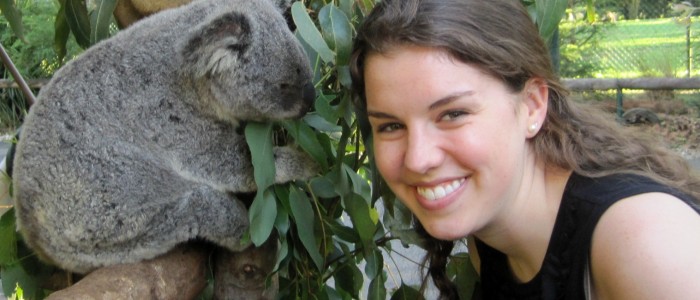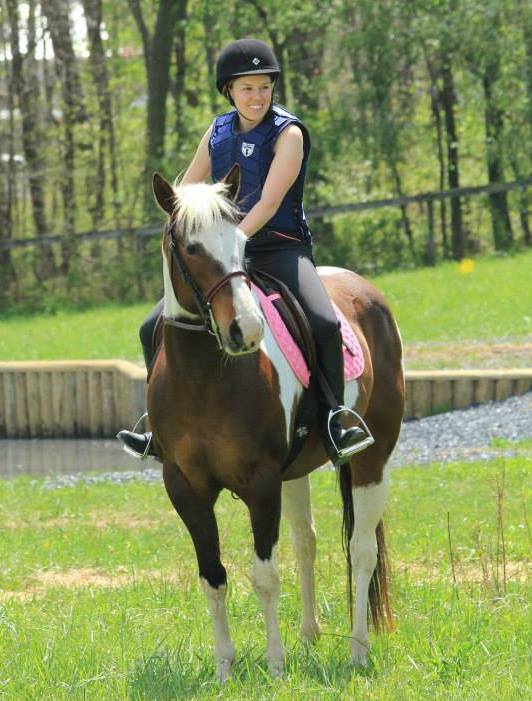[Student Interviews] Georgianna Mann (HNFE) – From water research and Graduate school to training horses and everything in between

This is the first in a series of one-on-one QnA sessions with Water IGEP students and faculty. While awareness of water issues worldwide is essential and often the focus of our published articles, a behind-the-scenes look at the people who are making new strides in water and health at Virginia Tech is equally important.
Today we feature Georgianna Mann who’s a PhD student in Human Nutrition, Foods, and Exercise.
1. Tell us about your journey into Graduate school. And, what made you decide to get a PhD?
As a wide-eyed, horse-crazed little girl until my senior year of college I wanted to be a veterinarian. I never let myself explore other options but added a food science minor to give myself an edge into vet school at University of Georgia. Well, the minor worked, and when I got the acceptance/bill (seriously, the second line is you now owe $15K for semester one) to vet school I realized I didn’t want to go anymore. A mad scramble ensued for graduate school applications. I applied to Virginia Tech on a whim but fell in love with Blacksburg and the food science program here at Virginia Tech.
While doing my research in Blacksburg I continued working for a study abroad program at UGA, Global Programs in Sustainability, which provided a unique opportunity for me to travel to Australia and serve as a teaching assistant. This experience encouraged a serious travel bug and my desire to teach. I’ve always had a personal interest in nutrition and after getting my Masters in Food Science I inquired about a PhD in Human Nutrition, Foods and Exercise. I never really allowed myself to formally explore nutrition since I didn’t want to be a “nutritionist”. I did some advisor hunting, and found my place in Elena Serrano’s lab. While she explained her projects to me and I had to keep myself from blurting “IWANNADOALLTHISFORFREE”, a clear sign that her lab was a perfect fit. It was confirmed then that a PhD was the perfect track to pursue.

2. How would you explain your research to your grandmother?
Very gingerly. She believed in soul food (fried chicken, biscuits, gravy, cobbler… imagine Homeplace food but better) and sweet tea with more sugar than tea. She also believed in active kids, something that isn’t as common these days. I’m fairly certain she would have a difficult time understanding that many kids these days don’t go out and play until the street lights come on. Instead many are stuck inactive in front of screens for school or fun. My research focuses on the new “Smart Snacks in School” policies which will regulate all foods sold in schools and not just the lunches and breakfasts. This includes vending machines, a la carte items and school store items. These foods and beverages are lumped into the title “competitive foods” because they compete with the National School Lunch and National School Breakfast programs. Policies regarding these foods in school widely at state, local, and school levels. This is the first national policy to make well-defined nutritional regulations of competitive foods. I would like to see if these policies change what schools sell and if it affects the diets of the kids in schools, specifically high poverty middle schools in Appalachian Virginia.
3. If you were talking to your peers, what details of your work would you add? And why is it exciting to work on?
I absolutely loved going through the student diet surveys. It’s true: inputting hundreds of them took hours and hours but I wouldn’t let anyone help me… I wanted to see them all. I have the baseline data which entails what middle school students (11-13 years old) eat/drink on a weekly/daily basis, demographic information, National School Lunch/Breakfast Program participation, free or reduced price lunch eligibility, weight, height and their perceptions of body image. What I found to be so fascinating was the perceptions of weight status in adolescent girls. More often than not, young girls would answer that they believed their weight to be normal and yet it seemed that every girl wrote they were trying to lose weight. It begs for some questions to be answered. Another notable survey discovery is that many students who are eligible for free or reduced price school lunches aren’t eating lunch from school. These are just observations but interesting nonetheless.
Another interested tidbit I’ve found from my data collection is that much of the to-be contraband items were for school fundraisers. Perhaps the most disheartening discovery is that many of the cafeteria managers, after speaking with them, expressed that students simply won’t eat if the food provided isn’t junk food even though it’s likely the only meal they have all day. These food preferences are formed first at home.
4. From your perspective (and that of your discipline’s), what are some imminent challenges about Water and Health that we as a society face? Is an interdisciplinary approach warranted?
It is hard to address any topic in nutrition without an interdisciplinary approach. The first thought that comes to mind is the abundance of sugar sweetened beverages that many adults, and children, consume on a daily basis. Moderation is okay for these items, but I have witnessed children as young as 4 years old gulping down a soda that their mother gave them at a food pantry no less. We know that sugar sweetened beverages are strongly tied to obesity: both in children and adults. One step to combat the problem is to promote moderation and replacing sugar sweetened beverages with water. I think this concerns policy makers, behavior experts, nutrition and even civil engineers. Many reasons are given for not drinking tap water ranging from the perception that the water is unclean to thinking water is just too “boring”.
5. How do you and your advisor as a team tackle research questions? Does your advisor influence ‘who you are’ and ‘who you will be’?
From day one I have felt part of a team. Elena quickly learned that I am extremely goal-oriented and need mini-deadlines to help me along. Elena encourages me to work hard by having high expectations but I know I can always ask for help when I need it. She has a genuine interest in food policy and this aligns very well with the research I’m working on. My lab mates make the experience that much more awesome. The overall atmosphere of my lab is fun-loving: running races, taking exercise classes and having celebrations together are common!
6. What are some things about Graduate school you wish you knew in undergrad – both the good and not so good?
It’s definitely hard. It’s not impossible, but be prepared for trial-and-error. There are no textbook answers. It’s important not only to have the knowledge, but know where to look if you don’t immediately know the answer. It’s problem-based learning which I love, but it’s difficult to go from a spoon-fed classroom into the new world of graduate school.
In graduate school it’s important to have two things: a solid group of friends and a stress relief. I’m so blessed that I found Northstar Church (accidentally!) on day one in Blacksburg. Through this church I’ve found friends, a barn family and an incredible horse. Having the horse outside of graduate school gives me an opportunity to feel successful even when a publication gets rejected or data doesn’t turn out quite right. Running is also a very wonderful, glorious stress relief tool.
7. In an alternate universe, what would you be doing if not getting a PhD?
I would probably be slamming my head against the desk in UGA’s vet school. I’m so grateful that my path changed. I kept in touch with my vet school friends, many of which just graduated this spring! They love what they do, but wow, I couldn’t imagine enduring what they have. Being on call at 2 am for emergency colic surgery? No, thank you.
8. Lastly, tell our readers some ways you unwind when not doing research/”changing the world”?
Anyone who knows me also knows about Dakota. She’s the aforementioned horse, a barely saddle-broken project I bought two years ago out of someone’s back yard in Tennessee (thanks, Craigslist!). We’ve had a lot of obstacles come our way, not just jumps, and I’ve been so impressed with her incredible will to please. I’ve never met a horse quite like her. We’ve had our share of thrills and spills… Schiffert and I are very well-acquainted… as well as Blacksburg Physical Therapy. It’s well worth the injuries and I’ve learned a lot, not just about horse training but about communication and patience. The poor students reading my ethics blog know all about this.


